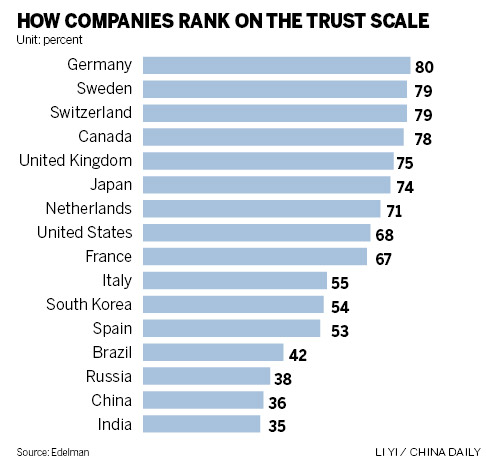Perception hinders attempts to take a larger role abroad, report says
Chinese companies are consistently less trusted than companies headquartered in the developed nations, a major hurdle for the growing number of Chinese enterprises looking to "go global", an international survey has found.

Of the 33,000 respondents polled online in 27 countries, only 36 percent regarded companies headquartered in China as "trustworthy", according to Edelman, a leading public relations firm.
China was among countries that garnered the lowest trust level worldwide, along with Russia (38 percent), India (35 percent) and Mexico (34 percent).
This year’s survey result showed little improvement in Chinese companies’ worldwide trust levels. The same study a year ago showed 19 percent of respondents in developed countries regarded companies headquartered in China as "trustworthy", whereas in other emerging markets 58 percent of respondents trusted China’s businesses.
This was in stark contrast to perceptions of companies from Germany, Sweden and Switzerland, which more than 70 percent found trustworthy.
"Companies headquartered in BRIC (Brazil, Russia, India and China) nations continue to suffer a trust discount, not just compared with Western-based companies, but also among respondents in Western markets," the report said, indicating China was not the only developing country that suffered.
The low trust toward Chinese companies has significant implications. Analysts said it means it will be harder for Chinese companies to conduct deals, and any that are carried out will cost more. The study found that 63 percent of respondents in developed markets did not welcome Chinese companies buying a company in their countries. Companies headquartered in other emerging markets such as India and Brazil faced a similar situation.
However, there is a big gap between the perception of homegrown businesses and the global view. The survey found that while only 36 percent of world respondents have faith in Chinese companies, 76 percent of Chinese respondents trust their local companies. The same situation also applied to other emerging markets.
A previous report by Edelman concluded that in developed markets, the most common perception of China-based corporations is they lack transparency and openness. Developed market respondents also think Chinese companies have failed to produce high-quality products and haven’t acted responsibly in a crisis.
"Although respondents in different markets identify similar criteria as components for building trust, there are nuances. For example, in emerging markets, high-quality products are identified as the most important base for building trust.
"Meanwhile, treating employees well is not regarded as that important, but their counterparts in developed markets think it is," said Cao Gang, chief executive officer of Edelman (China) Group.
This means Chinese enterprises should pay attention to these nuances when they are operating in overseas markets, he added.
To build trust, Edelman’s report also suggested chief executive officers should be "active engagers" in building their company’s trust. CEOs should be able to "communicate clearly and transparently", "be front and center during challenging times" and "engage employees regularly to discuss the state of the business".
Fan Hong, a professor of corporate communication studies at Tsinghua University, said CEOs from many Chinese companies still shy away from communicating directly with the public.
"In private conversations, they are excellent talkers, but when we asked them to give an interview to the media, they flatly refused. In fact, CEOs’ public communications are vital to a company’s image," she said.
